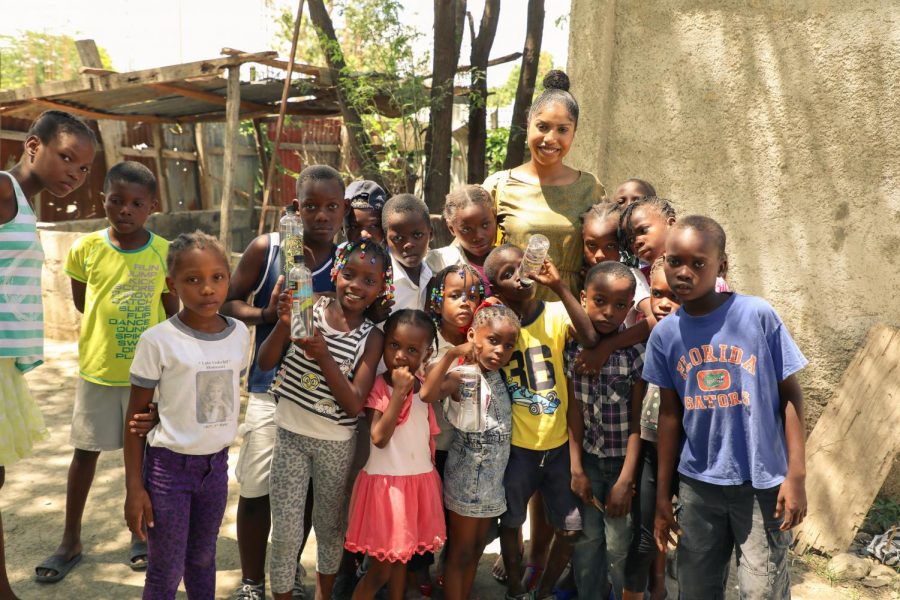In summer 2018, University of Wisconsin-Milwaukee 2019 graduate Steven Duclair returned to his birth country of Haiti for the first time since moving away in November 2007 at 12 years old.
The trip lit a spark inside Duclair.
“It was like me going back to Haiti and being in my community was … finding my true place in the universe,” he said.
Duclair and three other students, including senior in the College of Arts & Sciences Nikia Johnson, partnered with the local Milwaukee community to fundraise and collect donations of shoes and school supplies. Their partners included Macy’s, St. Robert Catholic Church and School, Plymouth Church and the Medical College of Wisconsin.
During the weeklong trip, the group was able to deliver more than 1,000 pairs of shoes and build three water filtration systems.
But they needed to do more, Duclair said.
“When you get there, you realize that they don’t go to school, they live in the slums, and they’re missing meals. You realize ‘Wow, a pair of shoes is not their most important need,'” Duclair said. “(As a) matter of fact, not their 50th-most-important need.”
When asking locals what it was they truly needed, Duclair said there was one common answer: education.
The group returned from the trip determined to build a school in Haiti. In October 2018, known as Sustain the Future, the group officially became a 501(c)(3) nonprofit organization, which allows their donors to give on a larger scale, Johnson said.
Sustain the Future includes nine members. The four core members are communications director Duclair, operation director Johnson, marking director Nicole Jordan and project director James Steiner.
Steiner is a professor in the Department of Planning and Landscape Architecture at University of Wisconsin-Madison. He became involved with the project after Duclair spoke at Plymouth Church, where Steiner is an attendee. Steiner, who said he has experience in commercial architecture in addition to teaching design at UW-Madison, offered his services.
Between Steiner, Duclair and Johnson, Sustain the Future has connections with UW-Madison, UWM and Marquette, creating a sort of “academic collaboration,” Steiner said.
Steiner said he was drawn to the project after Duclair spoke about taking action to help an impoverished community in a long-term way. The name Sustain the Future reflects the organization’s mission to not merely donate supplies, but to build a sustainable community, Duclair and Johnson said.
“That’s our goal. We don’t want to necessarily be a charity for the community,” Johnson said. “What we want to be able to do is help build up a sustainable economy.”
Sustain the Future has 20 acres of land in Anse-à-veau, Haiti, a community a few hours outside Haiti’s capital, Port-au-Prince. Since becoming a nonprofit, they have taken two trips to Haiti, in March and July of this year.
In March, Sustain the Future visited potential sites for the school and met with several organizations that already established schools in underserved communities of Haiti, Duclair said. In July, the group returned to obtain nonprofit status in Haiti, which is a separate process from becoming a 501(c)(3) nonprofit organization in the United States, Duclair said.
Duclair said Sustain the Future will return to Haiti next month to sign paperwork officially acquiring the land. They then intend to travel back in November to do land surveys, geotechnical analysis and schematic design. Once they complete those, they can begin construction documents and designs, Duclair said. With funding, they plan to break ground in about six months.
Sustain the Future is currently in the fundraising stages, Duclair said.
Building a school is the first step in Sustain the Future’s five to 10-year plan to create a sustainable community, he said. After 10 years, the organization intends to no longer be needed by the community.
The nonprofit aims to create a replicable model to help communities around the world, Duclair said.
Once construction is underway, Duclair said the group plans to develop a documentary to share their replicable model with the world. Additionally, Duclair said public speaking allows the organization to explain its process and recruit donors interested in getting involved.
Community engagement is an important part of the organization’s mission, both at home in Milwaukee and in Haiti, Duclair said. Some citizens of Anse-à-veau have shown their support by offering to allow construction to interfere with their farmland if necessary, he said.
“We want a situation where the people are involved, and there’s responsibility that’s being taken on their end,” Duclair said. “At the end, they will feel ownership from this project, and when they feel ownership, it’s a great thing because then you’ll be able to … restore the pride in their culture and restore the individual pride in who they are.”
Sustain the Future currently has internship opportunities for students in a variety of fields, Johnson said. Companies and individuals looking to get involved, donate or follow the group’s journey can visit Sustain the Future’s website or follow them on Instagram @stf.global.



